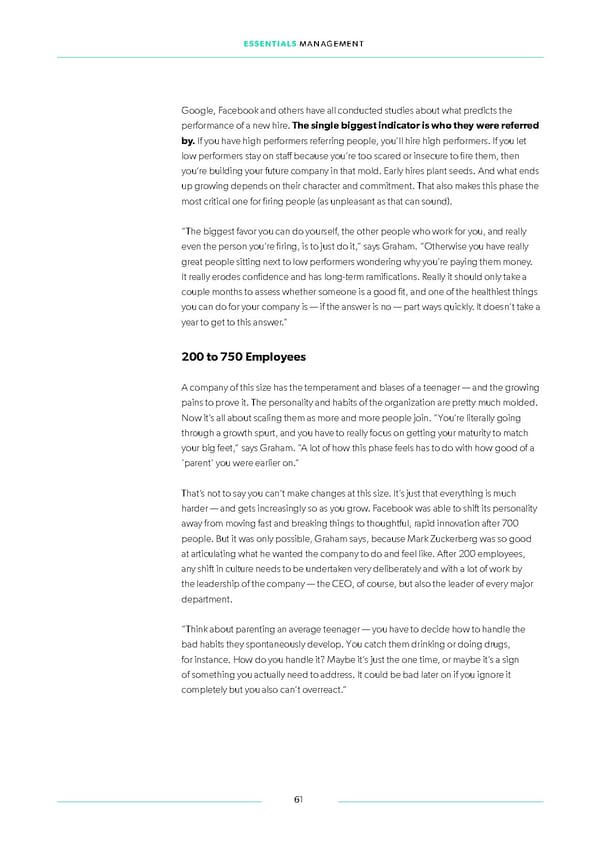ESSENTIALS MANAGEMENT Google, Facebook and others have all conducted studies about what predicts the performance of a new hire. The single biggest indicator is who they were referred by. If you have high performers referring people, you’ll hire high performers. If you let low performers stay on staff because you’re too scared or insecure to ifre them, then you’re building your future company in that mold. Early hires plant seeds. And what ends up growing depends on their character and commitment. That also makes this phase the most critical one for ifring people (as unpleasant as that can sound). “The biggest favor you can do yourself, the other people who work for you, and really even the person you’re ifring, is to just do it,” says Graham. “Otherwise you have really great people sitting next to low performers wondering why you’re paying them money. It really erodes conifdence and has long-term ramiifcations. Really it should only take a couple months to assess whether someone is a good ift, and one of the healthiest things you can do for your company is — if the answer is no — part ways quickly. It doesn’t take a year to get to this answer.” 200 to 750 Employees A company of this size has the temperament and biases of a teenager — and the growing pains to prove it. The personality and habits of the organization are pretty much molded. Now it’s all about scaling them as more and more people join. “You’re literally going through a growth spurt, and you have to really focus on getting your maturity to match your big feet,” says Graham. “A lot of how this phase feels has to do with how good of a ‘parent’ you were earlier on.” That’s not to say you can’t make changes at this size. It’s just that everything is much harder — and gets increasingly so as you grow. Facebook was able to shitf its personality away from moving fast and breaking things to thoughtful, rapid innovation atfer 700 people. But it was only possible, Graham says, because Mark Zuckerberg was so good at articulating what he wanted the company to do and feel like. Atfer 200 employees, any shitf in culture needs to be undertaken very deliberately and with a lot of work by the leadership of the company — the CEO, of course, but also the leader of every major department. “Think about parenting an average teenager — you have to decide how to handle the bad habits they spontaneously develop. You catch them drinking or doing drugs, for instance. How do you handle it? Maybe it’s just the one time, or maybe it’s a sign of something you actually need to address. It could be bad later on if you ignore it completely but you also can’t overreact.” 61
 Essentials Management First Round Capital Page 60 Page 62
Essentials Management First Round Capital Page 60 Page 62